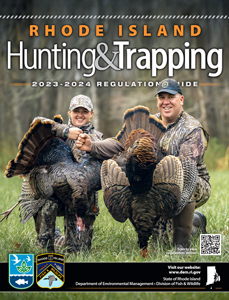Trapping
Species |
Dates |
Season Bag Limit |
Pelt Tagging |
Mink, Muskrat, Skunk, Raccoon, Opossum, Weasel, Red Fox, Gray Fox, Rabbit |
November 1 - January 31, 2024 |
none |
no |
Coyote – Private |
no closed season |
none |
no |
Coyote – State Land |
November 1 - January 31, 2024 |
||
Beaver – Private* |
November 1 - March 14, 2024 |
20 |
yes |
Beaver – State Land* |
December 1 - February 29, 2024 |
||
Fisher* |
December 1 - 24 |
2 |
yes |
General Regulations
- No person shall set, maintain, or tend any trap without first obtaining a trapping license from the Department of Environmental Management. A resident of this state may set traps on property which they own and on which they are domiciled without obtaining a trapping license (RIGL 20-16-7). All season restrictions, bag limits, tagging requirements, and other trapping laws and regulations apply.
- Every holder of a trapping license shall make a report of the number and species of all furbearing animals taken by him or her on forms provided by the Department within thirty (30) days of the end of the trapping season and before the expiration of the holder’s license. No renewal of a trapping license shall be granted unless the report has been made (RIGL 20-16-12).
- Traps may not be set, staked, or placed prior to sunrise on opening day.
- All traps must be labeled with the trapper’s current RI trapping license number attached by a metal tag or embedded or cut into the trap (RIGL 20-16-7).
- Written landowner permission is required to trap on private land (RIGL 20-16-9).
- All traps must be checked at least once in every 24-hour period (RIGL 20-16-9).
- There is no open season on bobcat or river otter.
Types of Traps Permitted
Furbearers for which there is an open season may be taken in: box (a.k.a. “cage”) traps, body-grip (a.k.a. “conibear”) traps, or species specific traps, with the following restrictions:
Body-grip Traps
Private land: Body-grip (a.k.a. smooth wire or “conibear”) type traps up to six and one half (6.5) inch jaw spread (i.e. “110, 120, 160” or equivalent) are permitted on land or in water on private land. Body-grip type traps greater than six and one half (6.5) inch but not exceeding eight (8) inch jaw spread (“220”) may only be set if completely submerged in water or set no less than six (6) feet above the surface of the ground. Body-grip traps greater than eight (8) inch but not exceeding ten (10) inch jaw spread (“330”) may only be set completely submerged in water.
State land: Body-grip traps up to six and one half (6.5) inch jaw spread are only permitted in water sets (i.e. all or a portion of the trap in water) or if placed six (6) feet above the ground. Body-grip traps with a jaw spread greater than six and one half (6.5) inches but not exceeding ten (10) inches (“220-330”) may only be set if completely submerged in water.
Box Traps
The use of box traps is permitted on private and state lands.
Species Specific Traps
The use of species specific traps is permitted on private and state land. A species specific trap is characterized by all of the following: triggering and restraining mechanisms are enclosed within a housing; triggering and restraining mechanisms are only accessible through a single opening when set; access opening does not exceed 2 inches in diameter; triggering mechanism can only be activated by a pulling force; has a swivel mounted anchoring system.
Permit to Trap State Lands
All trappers harvesting furbearers from state management areas must first obtain a Permit to Trap State Lands (no fee), issued by the Division of Fish & Wildlife by calling 401-789-0281 or by emailing [email protected], in addition to their current R.I. trapping license, obtained through the online licensing system: rio.ri.gov.
Prohibitions
- The use of poisons or snares (RIGL 20-16-6).
- The use of steel-jawed leghold traps (RIGL 20-16-8).
- No person shall disturb, tend, or possess a trap of another, or take an animal from the traps of another unless specifically authorized to do so (RIGL 20-16-11).
- The setting of traps within ten feet of a beaver lodge or bank den or within eight feet of a muskrat lodge unless authorized by special permit.
- The taking or possession of a road-killed furbearer (RIGL 20-16-1), unless with a current R.I. trapping license and during the open season for that species or as provided for under a current RI Scientific Collectors Permit (RIGL 20-1-18) or otherwise permitted by the Division.
- The relocation of beaver.
- The use of deadfalls, pitfalls, fish hooks, treble hooks, or other similarly sharpened instruments to catch, capture, or injure furbearers is prohibited.

